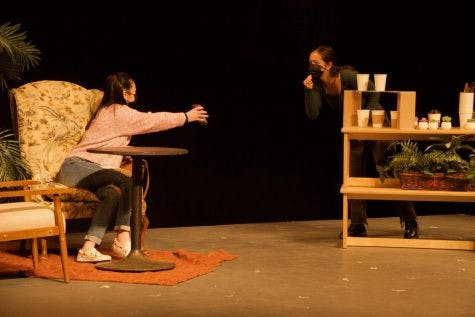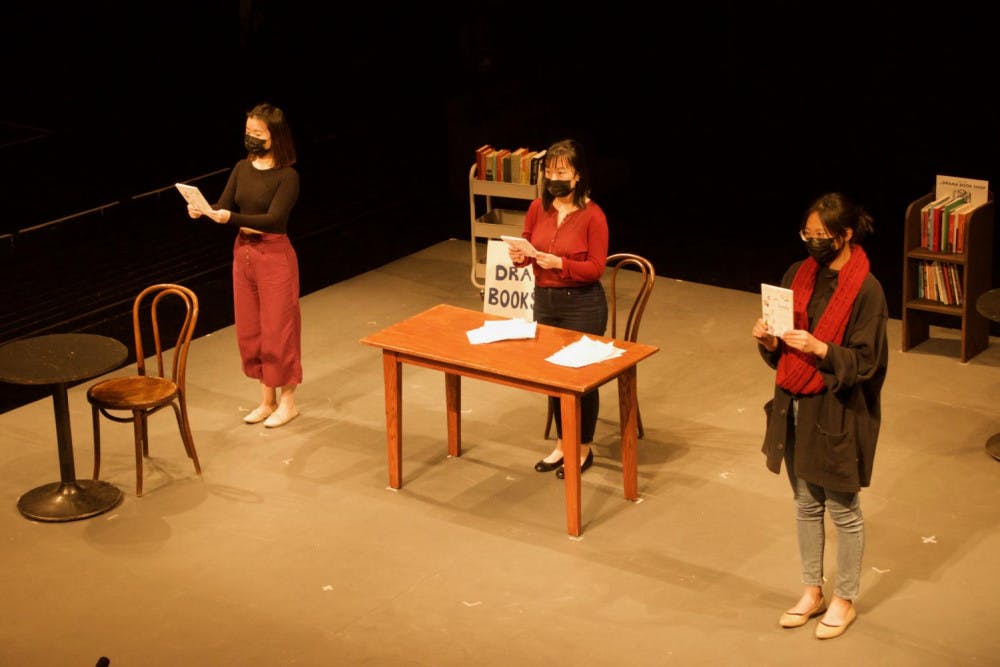“finally,” a collection of short plays and monologues written by Asian American and Pacific Islander (AAPI) playwrights curated by Emily Ballou ’21 for her senior work in directing, turned a spotlight on the lack of Asian representation in the media and the performing arts. The show, which ran in-person and virtually on Nov. 6 and 7, explored themes of belonging, acceptance and identity.
Ballou said that she had the idea for her senior independent project about Asian American representation in performances while watching Lauren Yee’s show “Cambodian Rock Band” during a theater department trip. “It dawned on me when the curtain fell that I was in a majority-Asian audience, seeing a story with a stage full of Asian actors,” she said. “I couldn’t fully explain my emotions, but on the long bus ride back to Middlebury, I realized for the first time in my life, I felt seen.”
Inspired by the presence of a historically and currently underrepresented Asian community, “finally” followed the journeys of Asian students, writers, actors and musicians as they navigate the obstacles of the white-dominated artistic world.
“AAPI representation on stage and on screen has been extremely limiting,” Production Assistant Sean Rhee ’21 said. “Many AAPI actors had to play stereotypical ‘fresh off the boat’ immigrant roles and imitate Asian accents because they didn't have other available options. So, this production clearly expresses that AAPI playwrights and actors have so much potential beyond those tropes.”

At the show, the curtains open on a small bookshop where two women peruse the selection of plays lining the shelves, setting the scene for Mia King’s “You Barely Existed.” The characters engage in a discussion about the limited selection of monologues available to budding Asian American actors and the young actress is left disappointed after seeing few options for leads that she can relate to and portray.
The following plays explore different dimensions of the Asian American experience. Lauren Yee’s “King of the Yees,” addresses the difficulty of not being considered “fully” Asian in the eyes of society. And “Once Upon a (Korean) Time,” written by Daniel K. Isaac, demonstrates feelings of invisibility in an alienating society. “This show is dedicated to those who struggle with their identity and still feel alone,” Ballou said.
“Peerless” by Jiehae Park explores the pressure among Asian communities to leave behind a legacy. On stage, two girls discuss the obligation they feel to secure careers in the medical field. The next piece, Carla Ching’s “Nomad Motel,” grapples with the competing ideals of monetary success and happiness as the character attempts to deviate from familial expectation of “being great” so that he can be happy. Next, “Keep Me Posted” by Stephanie Kyung-Sun Walters comments on finding connection in an increasingly digital world.
The show concluded with “Usual Girls” by Ming Peiffer, which explores low self-esteem induced by social standards and advocates for strengthening the principles of feminism in the arts. In “Usual Girls,” Ballou took to the stage herself to recite Pieffer’s impactful monologue about shifting focus both inside and outside of theater to ideals of intersectional feminism and Asian representation.
“Given the ‘perpetual foreigner’ label that constantly follows AAPI communities and the rise in anti-Asian discrimination during the Covid-19 pandemic, this production fits perfectly into the modern context as well, indicating that we belong where we are,” Rhee said.
One of Ballou’s favorite things about the production was bringing in new actors who had not been previously involved in the theater and arts scene at Middlebury, which she described as a white and Eurocentric space. “It’s been a joy having the opportunity to provide a platform for students of color not previously involved in the theatre department, or theatre at all, a chance in the spotlight,” she said.
“finally” exists as a call-to-action for all members of the Middlebury community and the arts to hear and share a more diverse set of voices of color. In identifying a problem in theatre, Ballou hopes to encourage further inclusivity in lieu of the one-dimensional and often racist portrayals of Asian and Asian American characters.
“We need a new system, one not based on oppression, exploitation, or degradation. We must recreate a new one where all humans are seen and valued,” Ballou said.
Editors’ note: Emily Ballou, the director of “finally,” is an Arts & Culture Editor at The Campus and Sean Rhee, Production Assistant, is a Visuals Editor at The Campus. They were not involved in the editing of this article.




